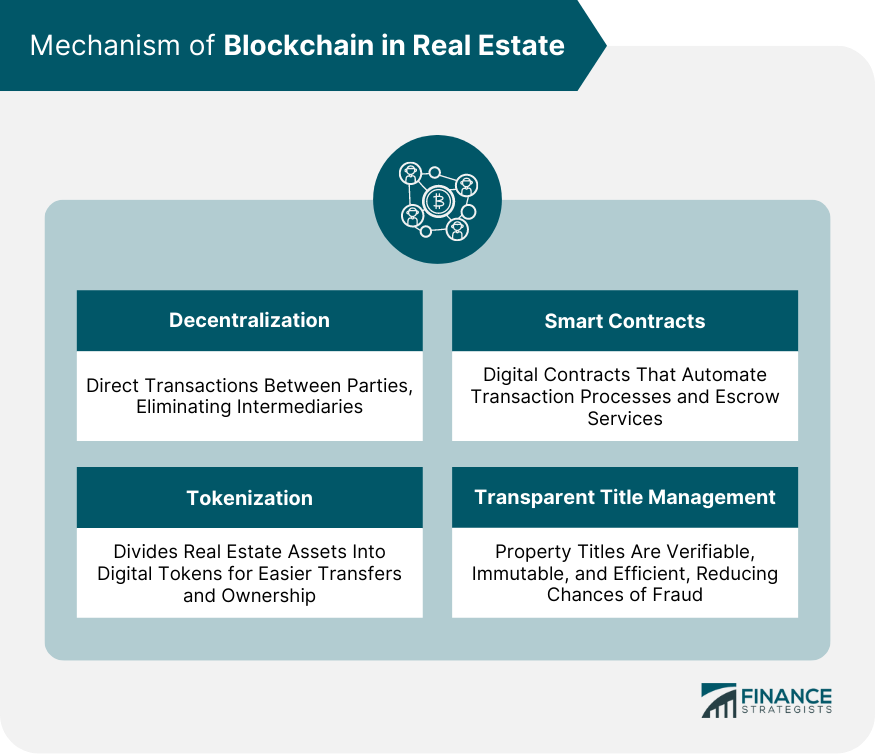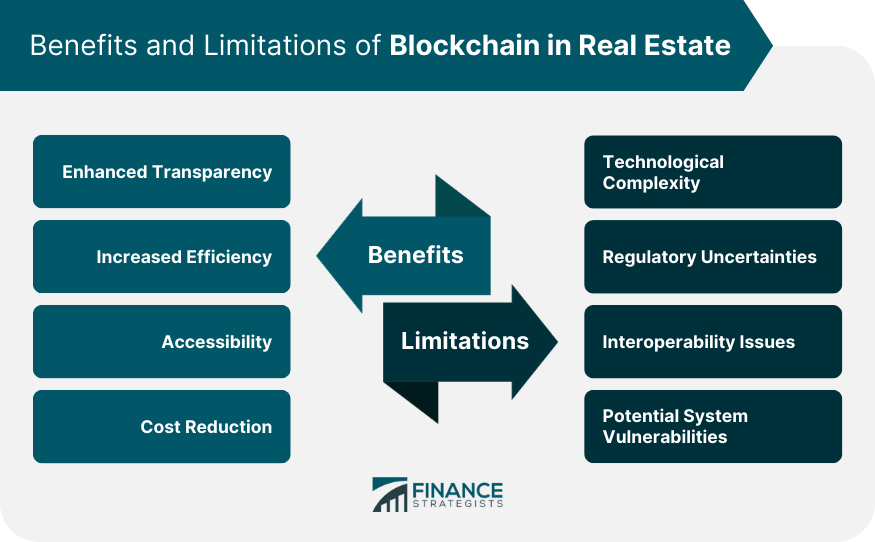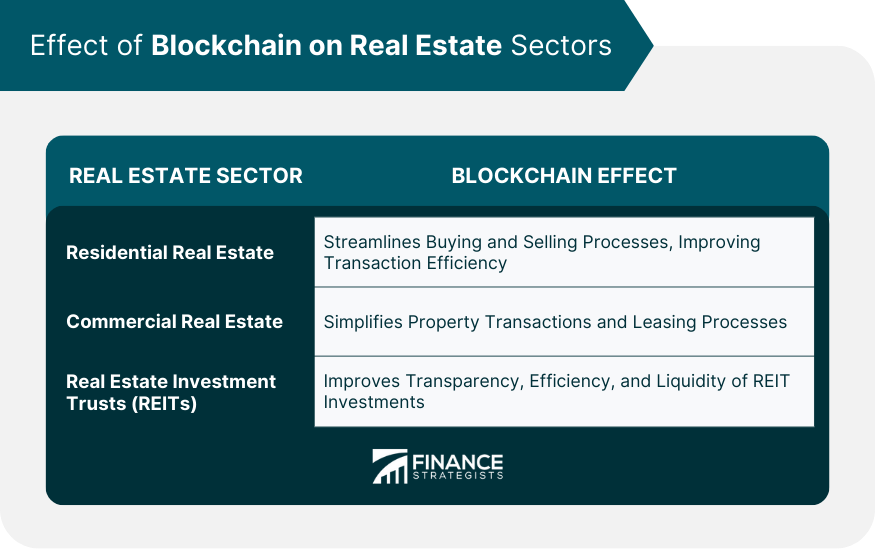Blockchain technology is essentially a decentralized and distributed ledger responsible for documenting and validating transactions without any central authority's intervention. Within the realm of real estate, blockchain facilitates property purchases, rentals, funds transfers, and document verification. When it comes to real estate, blockchain is the application of blockchain technology in the property market. Its purpose extends beyond the mere execution of transactions. It is instrumental in decentralizing transactions, increasing transparency, and enhancing the overall efficiency of processes in real estate. Blockchain is an integral part of real estate due to its capability to streamline complex processes, mitigate fraud, and improve transactions' efficiency and transparency. It tackles some of the industry's most prevalent issues, like double spending, transaction delays, and transparency deficits. Blockchain's relevance in real estate is established through several crucial aspects. The decentralized nature of blockchain, tokenization of real estate assets, smart contracts, and transparent property title management are some of the prominent aspects that exemplify blockchain's effectiveness in the real estate sector. The notion of decentralization is central to blockchain technology. In the real estate industry, it indicates direct transactions between parties, effectively eliminating intermediaries such as banks or real estate agents. With all transaction data securely stored on the blockchain, the transparency and immutability of the process assure the parties involved in the transaction. Tokenization involves dividing real estate assets into digital tokens, symbolizing the ownership of a portion of the property. The process makes transfers of property ownership easier, quicker, and more secure. Tokenization also democratizes the real estate market by enabling fractional ownership, making property investments accessible to a larger demographic. Smart contracts are an automation boon in the transaction process, cutting down the need for intermediaries. These are digital contracts that self-execute and enforce the terms of an agreement when the predetermined conditions are met. This aspect significantly streamlines escrow processes in real estate transactions, where funds are traditionally held by a third party until the transaction conditions are satisfied. Blockchain offers a superior alternative for property title management by enhancing its efficiency and reliability. Property titles stored on a blockchain are immutable and verifiable, making them more secure against fraud and disputes. This technology also eliminates the need for laborious and expensive title searches, making property transactions more efficient. Blockchain's influence on real estate extends to its enhanced security and transparency, increased efficiency, better accessibility and liquidity, and fraud and cost reduction. Blockchain's design assures a transparent and immutable ledger, offering augmented security and transparency. As every transaction is visible to all parties on the network, it's challenging to tamper with or forge transaction data. Such transparency also deters fraud and disputes as the information related to every transaction is easily accessible and verifiable. Blockchain significantly accelerates real estate transactions by automating processes through smart contracts and eliminating intermediaries. The reduction in paperwork expedites transactions, resulting in higher efficiency. Blockchain technology increases the accessibility of real estate through tokenization. Fractional ownership opens the doors of real estate investment to a larger population, enhancing liquidity in the property market. It also allows investors to buy and sell their property shares on secondary markets with ease. Blockchain technology is instrumental in reducing costs in real estate transactions by eliminating the need for intermediaries and reducing paperwork. Automating many transaction processes with smart contracts minimizes errors and reduces administrative costs. Additionally, the transparent and unchangeable nature of blockchain helps prevent fraud and double-spending. Despite the many benefits, the integration of blockchain in real estate also poses certain challenges, including technological complexity, regulatory uncertainties, standardization issues, and potential system vulnerabilities. The adoption of blockchain in real estate faces the hurdle of technological complexity. To use blockchain technology effectively, a significant level of technical understanding is required, which could pose a challenge for many in the real estate industry. It's also important to consider the learning curve associated with adopting any new technology. The legal and regulatory framework for blockchain and cryptocurrency is still in a state of flux. There could be challenges and uncertainties regarding the legal recognition of blockchain-based transactions and the regulatory status of tokenized assets. These uncertainties could pose risks for both property buyers and sellers. Currently, a lack of standardization in blockchain platforms may lead to interoperability issues. Different blockchain platforms may not interact seamlessly, making it challenging to integrate blockchain solutions into existing real estate systems. Despite being known for its security, blockchain is not entirely immune to hacks and system vulnerabilities. If a blockchain network is compromised, it could potentially impact all transactions recorded on that blockchain. Blockchain technology has significant implications for residential real estate, commercial real estate, and Real Estate Investment Trusts (REITs). Blockchain technology has the potential to significantly overhaul the residential real estate sector. By accelerating transactions, enhancing transparency, and reducing costs, blockchain can make the process of buying and selling homes more streamlined and efficient. Blockchain also promises substantial changes in the commercial real estate sector. Tokenization can simplify the buying and selling of commercial properties or shares of properties. Smart contracts can also streamline leasing and other processes in commercial real estate. REITs can reap benefits from blockchain through improved transparency, efficiency, and liquidity. Tokenization can make REIT investments more accessible and liquid, while blockchain's transparency can boost investor confidence. Successfully adopting blockchain in real estate involves understanding its challenges and finding ways to overcome them. It also requires the development of effective strategies for integration and implementation. Preparing for the incorporation of blockchain in real estate involves understanding the potential challenges and devising ways to overcome them. This process could involve educating real estate professionals about blockchain, collaborating with regulators to address legal and regulatory uncertainties, and working with technology providers to ensure interoperability and security. Effective strategies are key to successfully integrating and implementing blockchain in real estate. These may include running pilot blockchain projects, partnering with blockchain service providers, investing in blockchain education and training, and developing a comprehensive blockchain strategy that aligns with organizational goals. Blockchain technology's integration in real estate offers transformative potential. The decentralized mechanism enables direct, intermediary-free transactions, while tokenization allows for fractional ownership, broadening accessibility. Smart contracts facilitate automated transaction processes, and transparent title management adds a layer of security and efficiency. The benefits, including enhanced transparency, increased efficiency, and reduced costs, create a compelling case for its adoption. However, there are barriers to overcome, such as the technology's complexity, regulatory uncertainties, standardization issues, and potential system vulnerabilities. Blockchain's impact is anticipated to revolutionize residential and commercial real estate and Real Estate Investment Trusts (REITs) alike. The adoption of blockchain in real estate is not an overnight process; it requires education, collaboration, and strategic planning. As an investor, you should seize the opportunity to learn about this technology and its potential implications for your investments.Understanding Blockchain in Real Estate
Mechanism of Blockchain in Real Estate
Decentralization in Property Transactions
Tokenization of Real Estate Assets
Smart Contracts and Escrow Services
Transparent Property Title Management

Blockchain's Benefits on Real Estate
Enhanced Transparency and Security
Efficiency and Speed
Accessibility and Liquidity
Reduction in Costs and Fraud
Blockchain's Limitations in Real Estate
Technological Complexity and Learning Curve
Regulatory and Legal Uncertainties
Interoperability and Standardization Issues
Potential Risk of Hacks and System Vulnerabilities

Effect of Blockchain on Real Estate Sectors
Residential Real Estate
Commercial Real Estate
Real Estate Investment Trusts (REITs)

Preparing for Blockchain in Real Estate
Understanding and Overcoming Challenges
Strategies for Integration and Implementation
The Bottom Line
Blockchain in Real Estate FAQs
Blockchain in real estate operates through decentralization, tokenization, smart contracts, and transparent property title management.
Blockchain enhances transparency and security, increases efficiency and speed of transactions, promotes accessibility through tokenization, and reduces costs.
Challenges include technological complexity, regulatory uncertainties, interoperability issues, and potential system vulnerabilities.
Blockchain streamlines buying and selling in residential real estate, simplifies transactions in commercial real estate and improves transparency and liquidity in REITs.
Preparation involves understanding and overcoming challenges and developing effective strategies for integration and implementation.
True Tamplin is a published author, public speaker, CEO of UpDigital, and founder of Finance Strategists.
True is a Certified Educator in Personal Finance (CEPF®), author of The Handy Financial Ratios Guide, a member of the Society for Advancing Business Editing and Writing, contributes to his financial education site, Finance Strategists, and has spoken to various financial communities such as the CFA Institute, as well as university students like his Alma mater, Biola University, where he received a bachelor of science in business and data analytics.
To learn more about True, visit his personal website or view his author profiles on Amazon, Nasdaq and Forbes.











